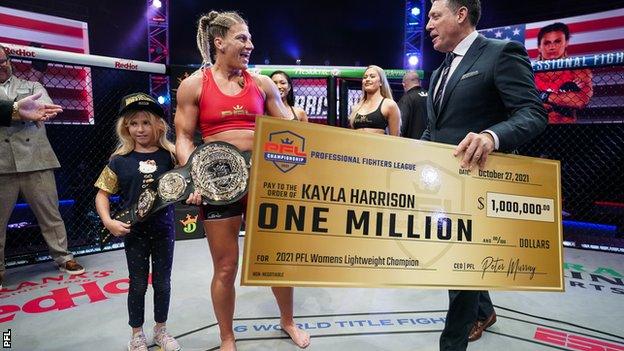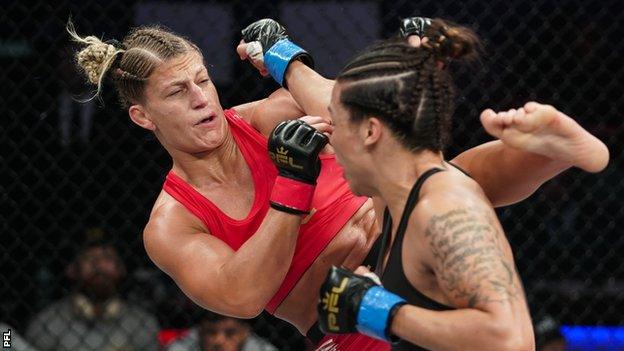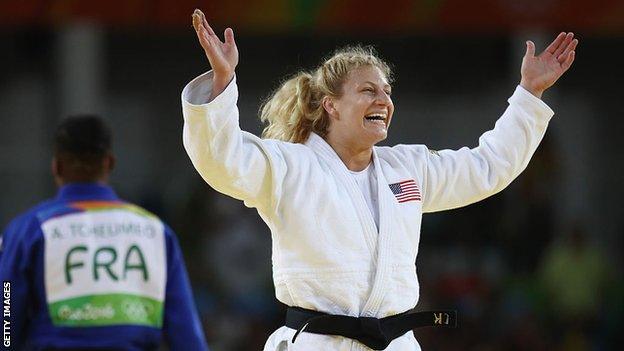Meet double Olympic gold medallist turned multi-millionaire MMA champion Kayla Harrison
- Published

Harrison is a two-time PFL lightweight champion
It was 2017 and, after winning two Olympic gold medals in judo back to back for the United States, Kayla Harrison became a couch potato.
Depression hit. Ambition dissolved.
"I sort of fell into a depression," the 31-year-old tells BBC Sport. "You go from waking up at 5am every day and never hitting the snooze button, to being a couch potato.
"I didn't set an alarm, I didn't leave my house, I hadn't watched TV in years and all of a sudden I'm six seasons deep in all these Netflix shows. It was bad.
"It was like in the movies where you see the guy who has broken up with his girlfriend and he just has trash everywhere. That's how I probably looked, I was just a mess."
Then she discovered mixed martial arts, her skills transferred. According to the American fighter, her fire for MMA might even burn more ardently now than her love of judo, which began at the age of six.
MMA - kinetic chess - has challenged all her sensibilities. She dominated the Professional Fighters League (PFL) lightweight division in the 2019 and 2021 seasons, twice pocketing the $1m prize.
When the PFL comes to London in August, of which there are plans being put in place, she wants to headline here - the scene of her first Olympic gold in 2012.
"I'm a big believer in doing something that sets your soul on fire. I'm much more of a do-er. I don't just watch people, I like to go do things," Harrison adds.
"So, about six months after the Olympics I went to a local gym in Boston and started doing some Muay Thai, had my first sparring session and that was such an eye-opener for me.
"I was like, man, this is really hard. Getting punched in the face hurts. That was it and I was like, I've got to fight, I've got to at least try it. I can't live my life with a 'what if' hanging over me."
It has transformed her.
"If anything, this fire burns a little bit hotter just because I feel like one, I don't have as much time," she explains.
"I was six years old when I started judo and I'm 31 now, so I don't have as much time to get really good as I did with judo. And two, it's judo on steroids.
"In judo you have to worry about someone throwing you, choking you, arm barring you or pinning you. In MMA you have to worry about a million different things.
"Are they going to kick you in the head? Are they going to take you down? Are they going to punch you in the face? Are they going to hit you in the body? I've never done anything like it. I love it, I'm obsessed."

Harrison is undefeated in 12 pro fights
The UFC great Ronda Rousey played her part too. After transitioning from judo, she became MMA's first female superstar and UFC's first female champion.
Harrison recalls: "We spoke briefly after I think my second Olympics [in 2016] - or maybe it was before. She was still with Strikeforce at the time and I remember her messaging me saying, 'my boss is following your career', meaning [now Bellator president] Scott Coker.
"The number one thing she always told me was that if I ever did MMA I was going to need a thicker skin. She was very right."
The world of MMA and its fans can be brutal - successful or not. While Harrison is the lightweight champion in the PFL, fight fans are desperate to see her take on UFC two-weight champion Amanda Nunes and Bellator featherweight champion Cris Cyborg.
"I became the best in the world at judo and nothing changed. In MMA it's not really the case," Harrison says.
"I think the more successful I become the more attacked I become. It really used to bother me quite a bit, everyone had an opinion.
"People who had never met me were saying the most terrible things online, but I've kind of come to terms with it. I'm living my life out loud and chasing greatness - and with that comes critics."

Harrison won gold medals in judo at the 2012 and 2016 Olympics
But Harrison is equipped for it and draws on her life experience.
"I talk a lot in my interviews about legacy, obviously I do MMA for selfish reasons," she adds.
"I do it because I have this inner desire to be the best possible version of myself. But part of being the best possible version of myself is leaving an impact on the world - having an impact for the better.
"My legacy, I feel, will not only be what I do in the cage but how I carry myself outside the cage, what my children go on to do with their lives and the impact I can have on young girls and women in sport.
"I was sexually abused by my first coach and I'm very public about it. I have a foundation, I wrote a book and I'm very open about speaking about it.
"I refuse to be a victim. I want to help other survivors of sexual abuse and it started as that. But the more I speak and share my story the more I realise that, so badly in our society and in our world, we crave real heroes."
Heroes indeed - and Harrison is one of them.

'They'll kill you': Police investigate an extremely violent gang in Devon's drug economy
A battle over truth: What does the invasion of Ukraine have in common with the coronavirus pandemic?
